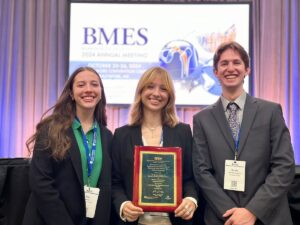Mechanical Engineering Professor Tommaso Lenzi’s HGN Lab for Bionic Engineering is no stranger to accolades; Lenzi and his colleagues build robotic prosthetics that are as futuristic as they are life-changing. Its Utah Bionic Leg, the first of its kind with powered knee, ankle, and toe joints, earned a place on TIME Magazine’s Inventions of the Year list in 2023, and was just named Breakthrough of the Year at the University of Utah Innovation Awards.

Now, three undergraduates from the lab have taken home another prize, as part of the NIH’s Design by Biomedical Undergraduate Teams (DEBUT) Challenge.
DEBUT, co-sponsored by the National Institute of Biomedical Imaging and Bioengineering and VentureWell, sees teams of undergraduate students demonstrate their research on innovative biomedical devices. A panel of expert judges from six other NIH Institutes and partners then awards prizes in a series of categories based on the project’s ability to address unmet health needs in that field.
The HGN Lab team, Elise Nielsen, Eleanor Stevens, and Duncan Stewart-Jackson, earned $15,000 for the National Center for Medical Rehabilitation Research, NICHD Rehabilitative and Assistive Technologies Prize. Stewart-Jackson represents the Department of Biomedical Engineering, while Nielsen and Stevens are in the Department of Mechanical Engineering; a testament to the interdisciplinary research at the core of their project.
That project, the U-Build Bionic Knee, is a low-cost prosthesis designed to improve mobility and quality of life for individuals with lower-leg amputation. Similar to the Utah Bionic Leg, the device generates assistive power at the knee joint, helping users with common mobility challenges presented by unpowered prostheses, such as sit-to-stand movements and climbing stairs.
The prize was sponsored in part by the Eunice Kennedy Shriver National Institute of Child Health and Human Development (NICHD). Other NIH partners sponsoring DEBUT Challenge prizes include the NIH Office of AIDS Research, the National Institute on Minority Health and Health Disparities, the National Cancer Institute, the National Institutes of Nursing Research, and the National Institute of Diabetes and Digestive and Kidney Diseases.
Read more about the other winners here.